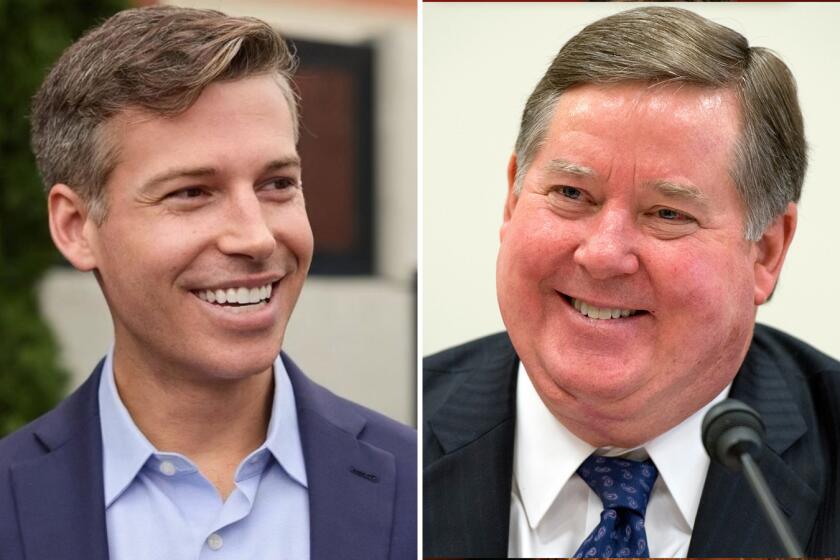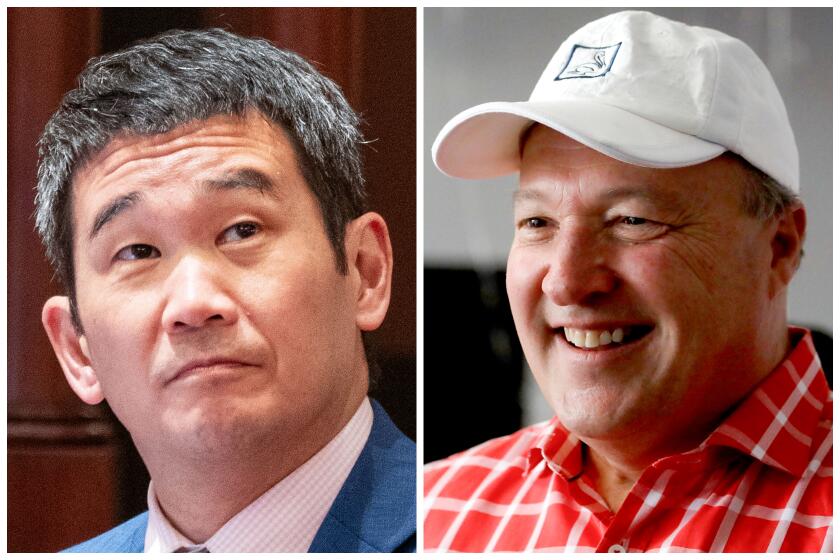Levi’s heir Daniel Lurie leads in early returns in heated San Francisco mayor’s race

SAN FRANCISCO — Philanthropist and Levi’s heir Daniel Lurie took the lead in early returns Tuesday, holding an edge against incumbent Mayor London Breed and three other Democrats vying in the heated race for San Francisco mayor.
But with thousands of votes still uncounted, the final results were far from clear. San Francisco’s ranked-choice voting system, which allows voters to select multiple candidates by order of preference, complicates the process of quickly identifying a winner.
The city uses a multiround process to count the ranked-choice ballots, and it could take several rounds of tallying before a winner receives more than 50% of the vote. After each round, the candidate with fewest votes is eliminated and those votes are redistributed to the remaining contenders.
Breed, a moderate Democrat and the first Black woman to hold the city’s mayoral post, had 25% of first-choice votes in early results, compared with 28% for Lurie, a fellow centrist Democrat.
The early returns showed Board of Supervisors President Aaron Peskin, the only candidate in the race running as an old-school progressive, with 22% of first-choice votes; venture capitalist Mark Farrell, a moderate, with 18% of first-choice votes; and Supervisor Ahsha Safaí trailing with 3% of first-choice votes.

Speaking to supporters Tuesday night at the bar Victory Hall in the South of Market district, Breed struck an upbeat tone and urged patience with early results. “It ain’t over ‘til it’s over,” Breed told the crowd. “I have been behind before. I have been counted out before.”
Meanwhile, in the Mission district, Lurie delivered what at times felt like a victory speech to a jubilant crowd gathered at the Chapel, a live music venue, after early results came in.
“We launched this campaign 13 months ago, because we believe strongly it is time for accountable leadership in City Hall,” he said to cheers. “Some have said that our campaign was underestimated. But they didn’t underestimate us. They underestimated you, the people of San Francisco, who demanded change.”
In a marked shift for San Francisco, the city’s wealthy tech sector played an influential role in this year’s mayoral race. Tech titans who have put down roots in the city — and who continue to see San Francisco as an international hub for high tech — poured millions of dollars into campaign contributions, pressing for an outcome that would infuse this famously liberal city with more centrist politics.
That money overwhelmingly benefited Lurie, Farrell and Breed.
Breed, a San Francisco native, was first elected in 2018, winning a special election after the unexpected death of then-Mayor Ed Lee. She has led the city through a challenging period that includes the unsettling early spread of COVID-19 and the subsequent exodus of scores of downtown tech workers who, amid pandemic-related shutdowns, found themselves able to work remotely — and more cheaply — from other cities.
Detractors painted the election as a referendum on Breed’s efforts to address sprawling homeless encampments, rampant property crime and a flagging post-pandemic economy that cut at voters’ sense of a safe, well-functioning city.
“People in San Francisco are frustrated. On crime, on homelessness, on conditions of the streets,” said Jim Ross, a veteran Bay Area Democratic strategist. “The other issue is, this is Year 6 for London Breed. Any politician, their sixth year in office is really a difficult year because people are really looking at you as ‘What have you done?’”
Breed has highlighted recent data showing improvements on some of those issues, notably a reduction in property crime and violent crime over the last year. She has touted her policies to bolster police staffing, increase drug-related arrests and clear homeless encampments. And she has promoted new initiatives to repopulate empty storefronts and enliven the night life with markets and music festivals.
Many of her supporters touted her quick action to shut down San Francisco in the early days of the COVID emergency, a decision credited with saving thousands of lives. And she earned influential endorsements from housing advocacy organizations based on her work to ease San Francisco’s affordable housing shortage.
“I am the change,” she often said on the campaign trail.
Her opponents dismissed that progress as too little, too late.
Both Lurie and Farrell promised a more concerted crackdown on crime and homelessness and to reinvigorate the downtown economy. They emerged as appealing alternatives among voters who appreciated Breed’s messaging but had lost confidence in her ability to guide San Francisco out of crisis.
Lurie distinguished himself as the political “outsider” running against four City Hall veterans. He pledged to root out government corruption, a concern among voters following a series of political scandals in city departments and nonprofits in recent years.
Lurie had the advantage of his family’s vast wealth from the Levi Strauss fortune to buoy his campaign and strengthen his name recognition. He showered his campaign with more than $8 million of his own money.
His mother, Miriam Haas, contributed more than $1 million to an independent committee backing his mayoral bid. She married her second husband, Lurie’s stepfather Peter Haas, when Lurie was a young boy. Peter Haas, now deceased, was the great-grandnephew of the Levi’s founder and a longtime executive at the company.
Breed frequently characterized Lurie as an inexperienced leader who relied on his family’s money to get ahead.
Lurie responded by touting his role as founder of Tipping Point, a San Francisco nonprofit that funds efforts to lift people out of poverty, to highlight his commitment to solving intractable problems. He said the organization has funneled $500 million to Bay Area organizations focused on early childhood education, school scholarships, housing and job training since its founding nearly two decades ago.

Farrell entered the race amid fanfare from supporters garnered during his seven years as a supervisor and six months as interim mayor before Breed was elected in 2018. He marketed himself as the candidate whose blend of political and business experience made him most qualified to get San Francisco back on track.
But his campaign was clouded by ethical concerns. This week, Farrell agreed to pay a fine of $108,000 following an investigation by city officials that determined he had illegally financed his mayoral campaign with money poured into a separate ballot measure committee he sponsored to reduce the number of government commissions in San Francisco.
Peskin, a longtime supervisor, organized a robust grassroots campaign that openly embraced a liberal agenda. He frequently contrasted his working-class donors with the massive influx of tech money flowing to Lurie, Farrell and Breed. He focused his campaign on traditional San Francisco ideals, such as making the city affordable for nurses, teachers and the artists and bohemians who have long made the city a creative hub.
More to Read
Sign up for Essential California
The most important California stories and recommendations in your inbox every morning.
You may occasionally receive promotional content from the Los Angeles Times.











